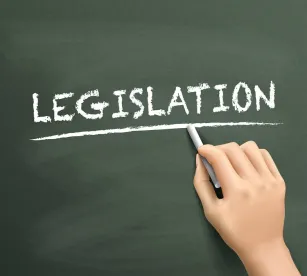In the early morning hours of June 30th, the North Carolina General Assembly adjourned its 2017 Long Session after a lengthy night of debate, negotiation, and casting votes. This year's adjournment date marks the second earliest Long Session adjournment since 1973, but the halls of the Legislative Building will not be empty for long.
2017 Adjournment Resolution
Unlike most Long Session adjournment resolutions, this year's document established two additional voting sessions in 2017 to take place in August and September. During those special sessions, legislators can consider taking up any legislation Governor Roy Cooper vetoes during their absence, or that makes appointments to state boards and commissions, or approves conference reports.
Potentially the most significant part of the adjournment resolution involves the conference reports. These reports are pieces of compromise legislation after the House and Senate pass conflicting versions of a bill and they are negotiated by conference committees appointed from both chambers. Several of the most controversial pieces of 2017 legislation were in the hands of conferees when the two chambers gaveled the end of the Long Session, but because of the stipulations of the adjournment resolution, the committees have been granted the August and September special sessions to negotiate.
The legislation currently in conference negotiations that could be finalized in August or September includes:
|
|
||
|
|
||
|
|
||
|
|
||
|
|
||
|
|
||
|
|
||
|
|
||
|
|
||
|
|
||
|
|
||
|
|
The adjournment resolution also stipulates that the two special sessions can address judicial, prosecutorial, and legislative redistricting in response to pending lawsuits. House leadership has indicated a desire to address judicial and prosecutorial redistricting during the September session. The adjournment resolution specified a November 15th final deadline for the court-ordered legislative redistricting to be finalized. The House and Senate appointed members from both parties to redistricting committees the evening before they adjourned.
The special sessions are also authorized to consider legislation related to the impeachment of elected officials. Although North Carolina Secretary of State Elaine Marshall's name does not specifically appear in the adjournment documents, one could safely conclude that any impeachment focus will be on Secretary Marshall. Representative Chris Millis (R-Pender) has alleged that Secretary Marshall's department is illegally commissioning non-citizens as notaries. Secretary Marshall, a Democrat, claims that the effort is a partisan political attack. It is unclear whether the effort to impeach Secretary Marshall during 2017 will go forward, but the adjournment resolution clearly leaves the door open to that possibility. If Secretary Marshall is impeached, it would be the first time a statewide executive office holder has been impeached in North Carolina since 1870. The House resolution calling for the investigation can be viewed here.
Final Actions
As is usually the case, there was a significant uptick in bill movement during the final weeks of the 2017 Long Session. Legislators worked extra hours to comb through long agendas, advancing several controversial pieces of legislation and abandoning others. This year, lawmakers' plates were especially full in that they filed 1,612 pieces of legislation but they had enacted an unusually low percentage of those bills going into the session's final days. At the time of this writing, only 91 of the 1,612 bills have been enacted and chaptered as Session Laws.
Legislation meeting certain House and Senate rules will remain eligible for consideration during the 2018 Short Session, while others would need to be filed again—most likely in the 2019 Long Session—to have another chance at becoming state law.
Of the bills passed, these significant, and in some cases, controversial bills slid through during the Long Session's final moments:
Renewable Energy
H589 – Competitive Energy Solutions for NC was originally presented as a compromise between Duke Energy, renewable energy providers, and large-scale energy consumers, but was revised several times in the final days of the session to include varying moratoria on permitting of new wind energy facilities.
Imposing a moratorium on facilities that generate wind power is not a new concept at the North Carolina General Assembly. Senator Harry Brown (R-Onslow) has been promoting legislation to do just that for several years, arguing that large wind projects have the potential to interfere with military training routes and low-level flight paths, thus jeopardizing the safety of service members as well as federal military investment in North Carolina.
Legislation put forth by Senator Brown and several House members would have imposed wind facility permitting moratoria, required new approvals by the state's Department of Military Affairs (DMVA) and Military Affairs Commission (NCMAC), as well as opportunities for base commanders to provide input.
When the session was drawing to a close and none of those bills had been enacted, Senator Brown added a four-year moratorium on wind project permitting to H589, retroactive to January 1, 2017.
While the moratorium concept has not traditionally been well received by the House, the House was very eager to pass H589 in its original form. As a result, both chambers appointed conferees to negotiate a compromise bill. The conferees negotiated for more than 24 hours, announcing a compromise around 1 a.m. on June 30th, roughly an hour before the end of the 2017 Long Session.
The negotiated legislation still includes the House's proposed reforms to the state's implementation of The Public Utilities Regulatory Policy Act of 1978 (PURPA) and the creation of a competitive procurement process for new renewable energy facilities. It also provides for a new renewable energy procurement program for large energy users, the military, and the University of North Carolina System in light of the expiration of the 2013 Green Source Rider Program.
A moratorium on permitting of new wind energy facilities was included in the compromise bill, but was pared down from 42 to 18 months, expiring on December 31, 2018. The bill also requires electric utilities to allow North Carolinians to participate in community solar programs which allow them to purchase stakes in solar farms and receive credit for the power that their share generates.
The compromise bill was swiftly approved by both chambers and has been sent to the Governor for his signature. Whether Governor Cooper will sign the bill into law remains unclear.
Brunch Bill
Whether you call it the "mimosa bill," the "brunch bill," "outrageous," "common sense," or just "Senate Bill 155," you can now call the bill allowing Sunday morning alcohol sales Session Law 2017-87 as it was passed by both chambers and then signed into law by the Governor on June 30th. For years, advocates worked tirelessly to enact legislation to allow restaurants to sell alcoholic beverages to patrons on Sundays beginning at 10 a.m., but they had been unable to overcome opposition from select legislators who cited religious and substance abuse concerns.
With strategic compromises and strong momentum throughout the session, this year the bill crossed the finish line and North Carolina joins 47 other states that allow some form of Sunday morning alcohol sales. The bill authorizes cities, counties, and the Eastern Band of Cherokee Indians to adopt ordinances approving the Sunday morning sales within their jurisdictions.
The bill also allows brewery taprooms to sell alcoholic beverages other than their own products and distilleries to provide free liquor tastings at certain events after securing the appropriate permits. The bill made several other changes to the state's alcoholic beverage laws, which we explained well in this article. The bill became effective upon the Governor's signature.
Surplus Computers to Low-Income Students
By expanding the definition of nonprofit tax-exempt organizations as it applies to the State Surplus Property Agency, Senate Bill 312 – Surplus Computers for Low-Income Students now allows the Department of Administration to donate the state's surplus computer equipment to nonprofits that refurbish computers for the purpose of donating them to low-income students and households. The Senate approved the bill 45-0 and the House 115-1. It was then signed into law by the Governor on June 28th.
State Budget
The stated purpose of legislative Long Sessions, which take place in odd-numbered years, is to enact a two-year state budget. Lawmakers return in even-numbered years to revise that budget for the second half of the biennium to reflect changes in revenue and priorities, but the bulk of the two-year budget framework is created during the Long Session.
Governor Cooper initiated this biannual appropriations process when he released his proposed spending plan for the state on March 1st. His budget called for $23.4 billion in state spending over the next fiscal year, representing a $1.1 billion increase over the current fiscal year budget. On May 10th, the Senate responded by sharing its fiscal priorities for the state in its own proposed budget. The Senate's budget called for significant corporate and personal income tax cuts while also recommended $22.9 billion in state spending. The Senate passed its budget on May 12th by a margin of 32 to 15 after three days of debate and consideration of 19 proposed amendments.
On May 31st, the House released its version of the budget, which also recommended $22.9 billion in state spending. House and Senate leadership reportedly met privately before beginning work on their budgets to agree on this number, a decision that streamlined the remainder of the budget negotiation process. The House plan contemplated more modest tax cuts than those approved by the Senate, did not cut individual or corporate income tax rates, and contained a slight increase to the standard deduction. The House passed its budget on June 2nd by a margin of 80 to 31.
On June 5th, conferees from both chambers were appointed to negotiate the differences between the two plans and produce a final adopted budget, or conference report. On June 19th, the conferees shared their conference report with the public, which was then approved by both chambers and sent to the Governor. Governor Cooper, a Democrat, vetoed the budget on June 27th, citing disagreement over priorities with the Republican-led House and Senate. The Senate relied on its Republican supermajority to override the Governor's veto that afternoon, with the House following suit with a veto override on June 28th. The enacted budget can be reviewed here.





 />i
/>i
